I’D LIKE TO RETURN THIS GIFT, PLEASE
The Geffen Playhouse has a proud tradition of staging crackerjack productions of dramatic works by some of the modern theater’s greatest playwrights. To their misfortune, though, these works invariably turn out to be the celebrated playwrights’ most excruciatingly dreadful plays – the ones, you suspect, that the 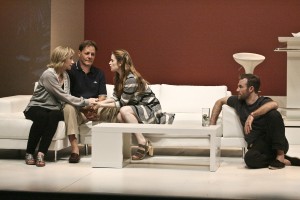 authors couldn’t quite take somewhere else.
authors couldn’t quite take somewhere else.
Olivier Award-winning Australian playwright Joanna Murray-Smith’s comedy of friends, art, and ideas, The Gift, is frankly a case in point: Here is clearly a writer of talent and insight; yet, throughout the play’s meditation on the topics of friendship, maturity and the nature of art, not a single honest thought bestirs the eddies of contrived behavior and pretentious discourse. The rare flashes of real emotion that do exist are unsupported subtext which do not relate to the situations or the characters.
Sadie (Kathy Baker) and Ed (Chris Mulkey) are a long-married, upper-middle-class couple who decide to take a vacation to a beautiful tropical resort. While there, they find themselves drawn to a delightful, much younger couple – handsome artist Martin (James Van Der Beek) and his journalist wife Chloe (Jaime Ray Newman) –  who are also vacationing on the island, having won the trip in a contest. In spite of the fact that they could not come from more different worlds – Mulkey is a pompous Alpha Male businessman with all the interior angst of a flounder, while Martin is a poor, but ambitious conceptual artist fond of risk and edge – the two couples find themselves inexplicably drawn to each other. They go out to dinner together, chat for hours over drinks, and then go on a sailing trip that winds up with Martin saving Ed’s life. In gratitude, the saved man promises the other any gift he wants, with surprising results. (A startling incongruity should be notated here: Ed, an avid boater who cannot swim, does not wear a life jacket. What are we supposed to read into that? The issue is never brought up.)
who are also vacationing on the island, having won the trip in a contest. In spite of the fact that they could not come from more different worlds – Mulkey is a pompous Alpha Male businessman with all the interior angst of a flounder, while Martin is a poor, but ambitious conceptual artist fond of risk and edge – the two couples find themselves inexplicably drawn to each other. They go out to dinner together, chat for hours over drinks, and then go on a sailing trip that winds up with Martin saving Ed’s life. In gratitude, the saved man promises the other any gift he wants, with surprising results. (A startling incongruity should be notated here: Ed, an avid boater who cannot swim, does not wear a life jacket. What are we supposed to read into that? The issue is never brought up.)
There are some promising underlying themes to be exploited here, particularly when we sense that the friendship between the couples is about more than what it seems: Does the stable, prosperous older couple admire the youngsters because they see 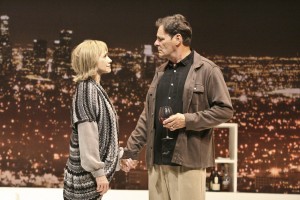 themselves when they were full of piss and vinegar? Is the younger couple in the market for a strapping new Sugar Daddy and Momma? Sadly, the performances are played so straight, any of these interpretations essentially leave the audience member to read stuff into the show that isn’t necessarily there, in the same way that a man wandering the desert imagines he sees a Tastee Freeze glinting in the distance. Also, two characters are assigned the pretentious task of breaking the fourth wall and speaking directly to us like a filmic voiceover, as if that somehow brings us closer to the story or elucidates the journey – which it does not.
themselves when they were full of piss and vinegar? Is the younger couple in the market for a strapping new Sugar Daddy and Momma? Sadly, the performances are played so straight, any of these interpretations essentially leave the audience member to read stuff into the show that isn’t necessarily there, in the same way that a man wandering the desert imagines he sees a Tastee Freeze glinting in the distance. Also, two characters are assigned the pretentious task of breaking the fourth wall and speaking directly to us like a filmic voiceover, as if that somehow brings us closer to the story or elucidates the journey – which it does not.
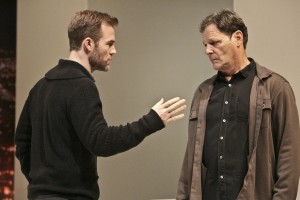 Except for a few moments during the life-or-death battle during the sailing trip, director Maria Aitken’s mostly static production allows the conversation to take the center stage at the cost of any concrete incident. The play’s first two-thirds consist of an exceedingly labored debate on the nature of art that plays like warmed-over, first-draft dialogue cuttings from Reza’s comedy Art – which the performers are never able to imbue with the excitement necessary to keep us enthralled; it’s like the direst chit-chat you ever had to endure at an art gallery opening or bohemian cocktail party.
Except for a few moments during the life-or-death battle during the sailing trip, director Maria Aitken’s mostly static production allows the conversation to take the center stage at the cost of any concrete incident. The play’s first two-thirds consist of an exceedingly labored debate on the nature of art that plays like warmed-over, first-draft dialogue cuttings from Reza’s comedy Art – which the performers are never able to imbue with the excitement necessary to keep us enthralled; it’s like the direst chit-chat you ever had to endure at an art gallery opening or bohemian cocktail party.
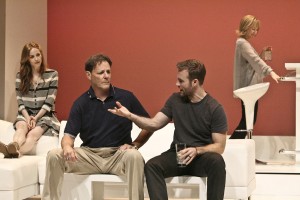 The final moral dramatic reveal, the gift request which provides the focus of the play’s last quarter, could potentially be provocative, but instead reeks of emotional dishonesty. This review shall remain Spoiler Free, but suffice it to say that the play indicates the dreadful request is done out of love. Even after brooding about the moral conundrum, we find ourselves analyzing the choice the characters make and thinking, not, “ah, what a brave statement about art and love,” but “who are they kidding? What pigs.”
The final moral dramatic reveal, the gift request which provides the focus of the play’s last quarter, could potentially be provocative, but instead reeks of emotional dishonesty. This review shall remain Spoiler Free, but suffice it to say that the play indicates the dreadful request is done out of love. Even after brooding about the moral conundrum, we find ourselves analyzing the choice the characters make and thinking, not, “ah, what a brave statement about art and love,” but “who are they kidding? What pigs.”
Aitken’s star-studded cast acquit themselves in, at best, a workmanlike manner. Mulkey, weakly channeling Homer Simpson, plays his businessman hubby as a bit of a one-dimensional boor, fond of muttering predictable anti-art clichés like “how  ya gonna make money doing THAT?” It’s not a particularly likable performance, and if the playwright’s purpose is to present an argument about the nature of art vs. the nature of being a “normal dude,” well, the deck is sure stacked against normalcy. At the same time, the smooth and rather bland-looking acting job by Van Der Beek leaves us strangely unconvinced that he’s any kind of a struggling artist – let alone a man with the turbulent psyche that would spur him to offer the deal he does. Baker’s shrill turn as Mulkey’s insecure wife is more irritating than funny, devolving into the sort of whiny twitches that usually indicate a lack of internal heft within the character.
ya gonna make money doing THAT?” It’s not a particularly likable performance, and if the playwright’s purpose is to present an argument about the nature of art vs. the nature of being a “normal dude,” well, the deck is sure stacked against normalcy. At the same time, the smooth and rather bland-looking acting job by Van Der Beek leaves us strangely unconvinced that he’s any kind of a struggling artist – let alone a man with the turbulent psyche that would spur him to offer the deal he does. Baker’s shrill turn as Mulkey’s insecure wife is more irritating than funny, devolving into the sort of whiny twitches that usually indicate a lack of internal heft within the character.
Ultimately, one leaves the theater with a disappointing sense of somehow being cheated – this is a play of intellectual debate with only the most flatfooted discourse, and it’s a play about morality and love with no real believable emotion. Even the presence of a stellar Hollywood cast can’t make this gift worth receiving.
photos by Michael Lamont
The Gift
Geffen Playhouse in Westwood
scheduled to end on March 10, 2013
for tickets, call 310-208-2028 or visit http://www.GeffenPlayhouse.com
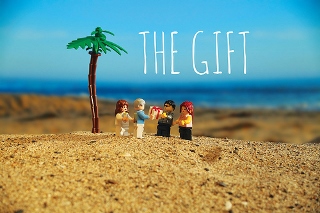
{ 2 comments… read them below or add one }
“A writer of talent and insight”? I have seen better dialogue written by robots.
Great review of a lousy play, Paul! The whole art vs. money dialogue was so full of clichés. And when Chloe and Martin finally revealed “the gift” it was terribly anti-climactic! It was impossible not to see that one coming.
I thought the moment Ed punched Martin was the most honest in an otherwise vapid show. I’m sure they decided to run the production straight through in 90 minutes with no intermission because otherwise the audience wouldn’t have come back!